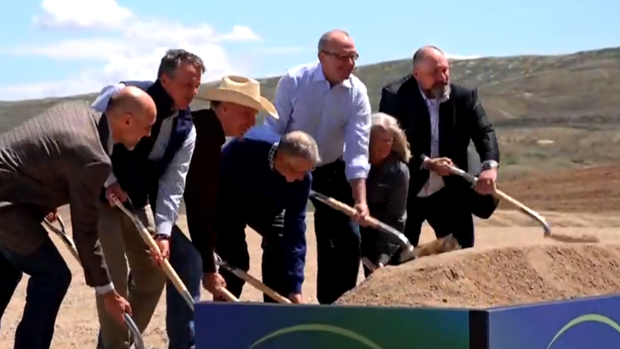By Kaia HubbardUpdated on: June 16, 2024 / 3:14 PM EDT
Washington — Microsoft founder Bill Gates said Sunday that he’s “quite confident” that a next generation nuclear power project will continue regardless of the balance of power in Washington next year, saying “support for nuclear power is very impressive in both parties.”
Gates and his energy company TerraPower are spearheading a major project that broke ground in Kemmerer, Wyoming last week — a nuclear power plant that relies on sodium cooling rather than water, which is believed to both simplify the process while also being safer, and could make nuclear energy a source of low-cost electricity. The company applied to the Nuclear Regulatory Commission in March for a construction permit an advanced nuclear reactor using sodium.
The project is on track to start producing power by 2030, and marks the first time in decades that a company has tried to set up the reactors as part of commercial power in the U.S. Nuclear power works without spewing out climate-changing greenhouse gasses. The site of new plant is adjacent to the Naughton Power Plant, which is set to stop burning coal in 2026 and natural gas a decade later, according to The Associated Press.
Gates touted that “nuclear has benefits beyond climate,” which he said has prompted the bipartisan support. While Democrats see value in the clean energy source, Republicans may take interest in energy security, he said.

“Of all the climate-related work I’m doing, I’d say the one that has the most bipartisan energy behind it is actually this nuclear work,” Gates said Sunday on “Face the Nation.”
For some, the value may lie in U.S. leadership and competitiveness on the issue, Gates said.
“You really don’t want the nuclear reactors around the world, made by our adversaries, because it’s economically a huge job creator,” Gates said. “And because the materials involved in these reactors possibly could be diverted, you want your eye on in making sure that it’s not feeding into some military related activity. And so the U.S. leadership in this space has a lot of strategic benefits.”
Gates said the country that’s building the most nuclear reactors is China, but if the U.S. tapped into its “innovation power,” it could be competitive.
“If we unleash the innovation power of this country, we tend to lead,” he said. “I feel great about the support we’re getting from the federal government in this nuclear space to take our history of excellence, and solve the problem that our current reactors are just way too expensive. And so let’s make the changes, you know, be willing to out-innovate our foreign competitors, to maintain that lead.”
One issue the project initially faced was that the uranium fuel would need to come from Russia. Gates noted that the project was delayed from 2028 to 2030 because of the fuel supply, with Russia’s war against Ukraine changing the calculus. But suppliers in the United Kingdom and South Africa, along with an eventual supply from uranium mines in the U.S. and Canada will allow the project to go forward, he said.
“We can go to the free world and meet our fuel requirements,” Gates said. “And so now building up the alternate plan, with the federal government helping us figure that out, that’s now completely in place.”




